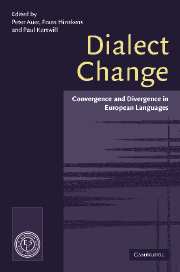Book contents
- Frontmatter
- Contents
- List of maps
- List of figures
- List of contributors
- Preface
- Map
- 1 The study of dialect convergence and divergence: conceptual and methodological considerations
- Part 1 Convergence, Divergence and Linguistic Structure
- Part 2 Macrosociolinguistic Motivations of Convergence and Divergence
- 6 Processes of standardisation in Scandinavia
- 7 The birth of new dialects
- 8 Dialect convergence in the German language islands (Sprachinseln)
- 9 Political borders and dialect divergence/convergence in Europe
- 10 The influence of urban centres on the spatial diffusion of dialect phenomena
- Part 3 Microsociolinguistic Motivations
- References
- Index
7 - The birth of new dialects
Published online by Cambridge University Press: 22 September 2009
- Frontmatter
- Contents
- List of maps
- List of figures
- List of contributors
- Preface
- Map
- 1 The study of dialect convergence and divergence: conceptual and methodological considerations
- Part 1 Convergence, Divergence and Linguistic Structure
- Part 2 Macrosociolinguistic Motivations of Convergence and Divergence
- 6 Processes of standardisation in Scandinavia
- 7 The birth of new dialects
- 8 Dialect convergence in the German language islands (Sprachinseln)
- 9 Political borders and dialect divergence/convergence in Europe
- 10 The influence of urban centres on the spatial diffusion of dialect phenomena
- Part 3 Microsociolinguistic Motivations
- References
- Index
Summary
New Dialects as Heightened Dialect Convergence: Research Issues
Introduction
New-dialect formation, as conceptualised by Trudgill and others (e.g. Britain and Trudgill 1999; Trudgill 2004), refers to the emergence of distinctive, new language varieties following the migration of people speaking mutually intelligible dialects to what, to all intents and purposes, is linguistically ‘virgin’ territory. As such, it is an extreme, and often very rapid, form of dialect convergence. Examples probably abound in world history, but only a few have been described in detail. There seem to be two main scenarios in which new-dialect formation takes place: the settlement of a relatively large territory, either previously uninhabited or in which a previous population is ousted or assimilated; and the formation of a new town in a geographically delimited area in which relatively intense interpersonal communication can take place. Examples of the former are the settlement of New Zealand largely by English speakers in the nineteenth century, and the transport of indentured labourers from the Hindi-speaking areas of the Indian subcontinent to Fiji, Mauritius, Trinidad, and South Africa, also in the nineteenth century. Examples of the latter are the establishment of the Norwegian towns of Høyanger, Odda, and Tyssedal, and the English town of Milton Keynes. In this chapter, we start by outlining the processes and stages found in new-dialect formation. Then we review the sociolinguistic histories of a number of new dialects – or immigrant koines (Siegel 1985: 364; Kerswill 2002a) as they are also known.
- Type
- Chapter
- Information
- Dialect ChangeConvergence and Divergence in European Languages, pp. 196 - 220Publisher: Cambridge University PressPrint publication year: 2005
- 60
- Cited by



